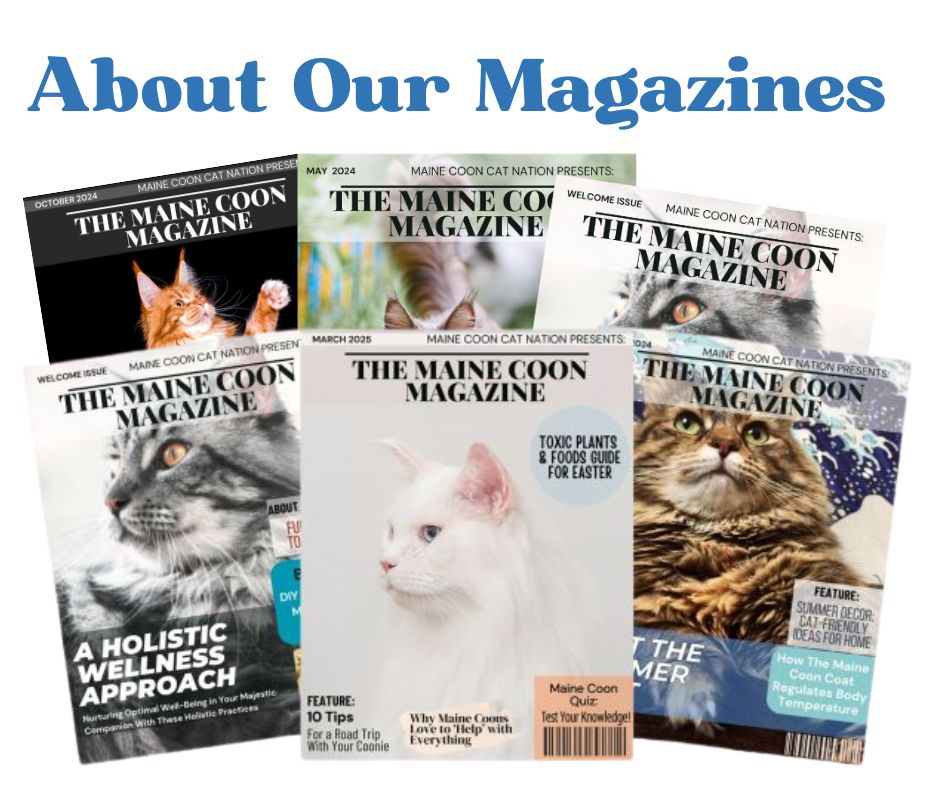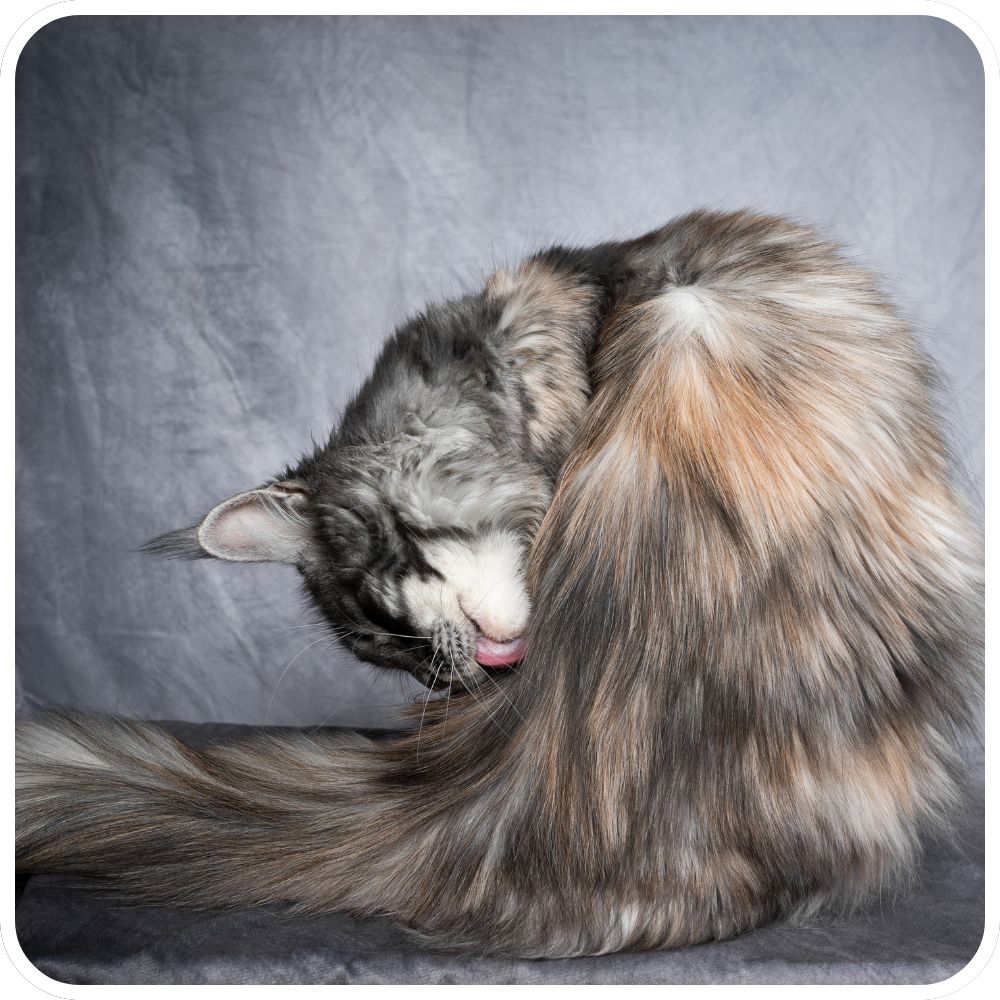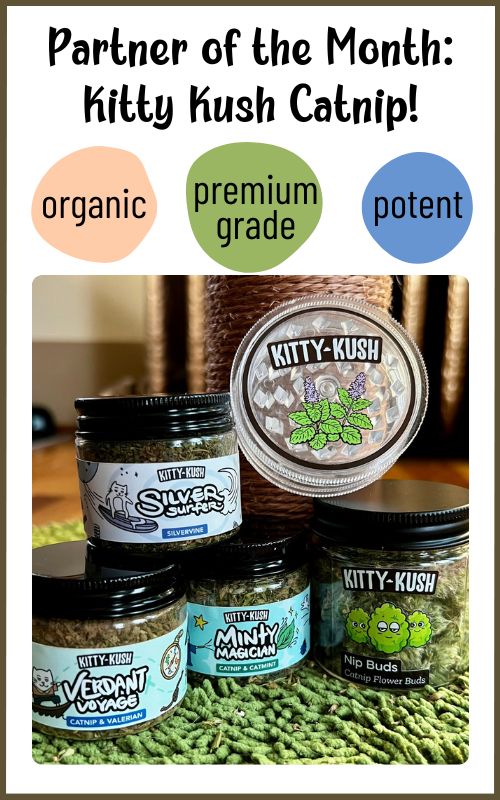- Home
- Maine Coon Grooming
Disclosure: this site is reader-supported. When you buy through links on our site, we may earn a small commission, at no extra cost to you.
Maine Coon Grooming Guide
Brushes, Mats, Lion Cuts and Shedding - Oh My!
Maine Coon grooming isn't actually all that hard! With a few tricks up your sleeve, these tips and tools will help you keep your Maine Coon’s coat in tip-top shape.
How Much Do Maine Coon Cats Shed?
If you've ever had the pleasure of meeting one of these gentle giants, you likely marveled at their magnificent, thick coat and wondered, "Do Maine Coons shed? How much?"
Shedding is a natural part of a cat's life.
Whether you're considering bringing one of these majestic cats into your home or are already a proud Maine Coon parent, understanding their shedding habits is key to keeping both you and your furry friend happy and healthy.
How to Groom a Cat with Long Hair:
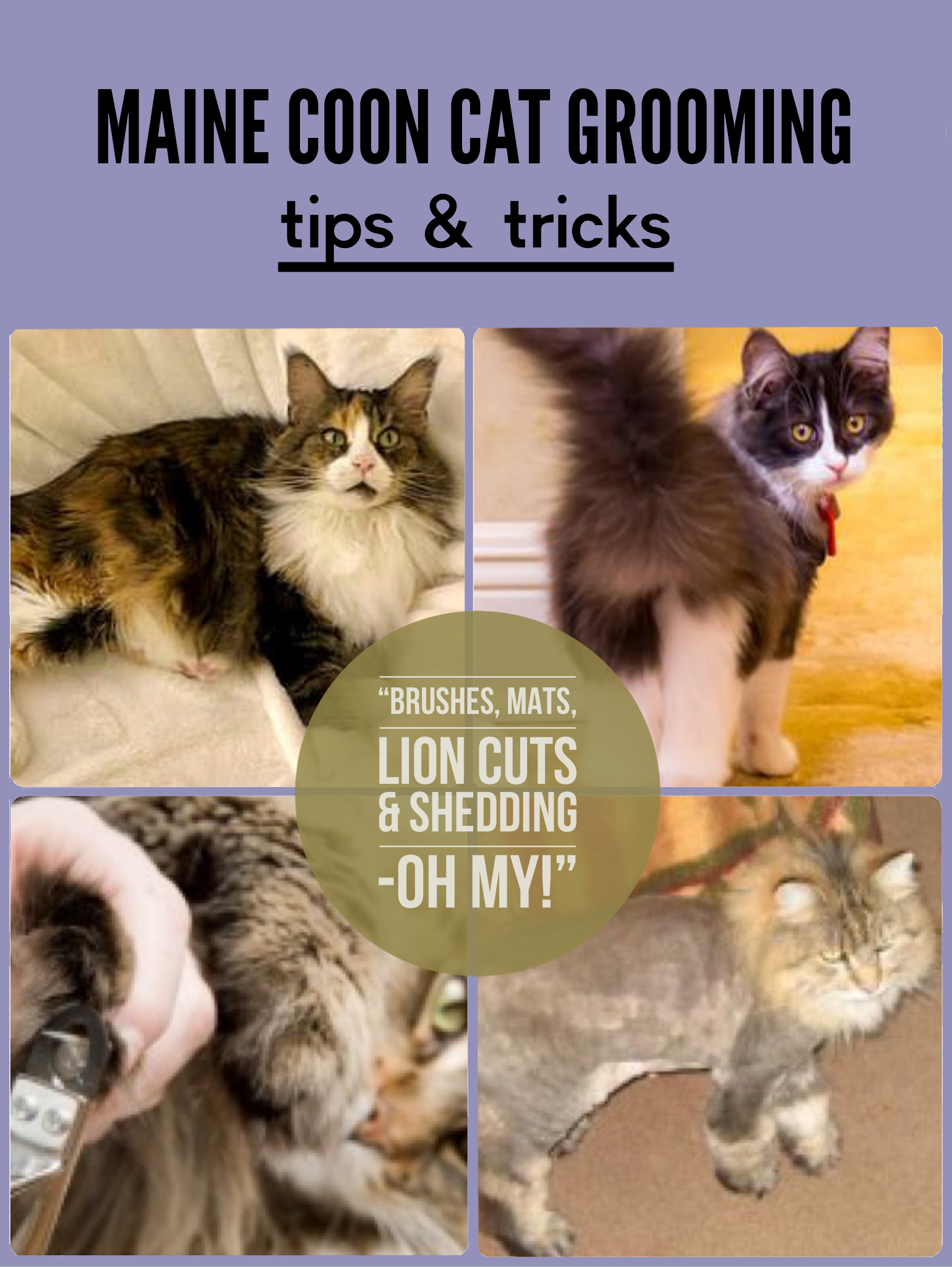
The first thing most people picture when they think about Maine Coon Cat grooming is all that fur.
It's true, they do have a thick coat, fluffy mane and big bloomers!
The beautiful coat of a Maine Coon is actually not as long and full as some other breeds.
The fur on their shoulders and back is shorter than the longer, heavier fur below. So that helps.
Also, this shorter fur with it's natural oils is shiny, glossy and not very prone to mats and tangles.
It goes without saying that regular brushing is in order to keep it in good condition. Thankfully, most Maine Coons are so docile that they are mostly cooperative for grooming time.
But, as much as Maine Coon owners love our Coonies and think they are the cat's meow, many of them just don't like the way being brushed feels.
Sometimes a grooming session seems pointless. Maybe your Maine Coon cat’s skin is sensitive, or maybe he is scared of the brush.
Here are our Top Tips for Maine Coon Cat grooming sessions:
Starting Young:
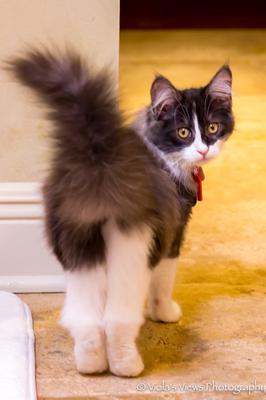 Little Azelin already has nice bloomers
Little Azelin already has nice bloomersA Maine Coon kitten may not need to be groomed yet, but it's definitely a good idea do it anyway!
Coonie kittens are definitely fluffy, but it's a fine baby fur that doesn't seem to need upkeep yet.
Keeping a few brushes handy and using one gently during snuggle time every day will train your Coonie to tolerate being brushed.
This is the time to introduce regular brushing, and even bath time.
A calm gentle and quiet bath in a bathroom sink under nice warm water probably won't even phase your kitten.
As he grows, you can add more stimulation and noise until eventually he's accustomed to the sounds and sensations of bathing in the tub.
Be Regular:
Try to have Maine Coon Cat grooming and brushing sessions on a regular basis, even if your Coonie looks just fine.
Keeping up with regular brushing, even just a little here and there, helps keep mats from developing.
Daily brushing may be a bit optimistic. If that's the case, a good brushing on a weekly basis is fine. Just do what you can!
Use Positive Reinforcement:
Having a few favorite treats handy to reward a patient kitty helps train them to consider this a positive, pleasant time.
Don't forget to include some soothing pets and calming words of praise and affection too!
How we treat and approach our Maine Coon Cat grooming time, whether it's a quick and rough job to get done, or a nice experience together, will be something a Maine Coon will learn.
Take Cues From Your Coonie:
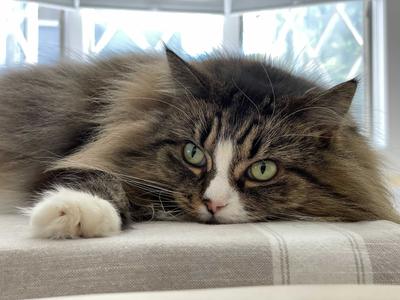 Lovely Holly
Lovely HollyIt's important not to push things.
If you get stopped by a stubborn mat, or use a brush that doesn't work easily and gets caught, or accidentally pull on a sensitive area, respect your cat's desire to be done for now.
Trust is so important! If she trusts you to let her go when she wants, she's more likely to sit patiently for a while - and more importantly, not to run away at the sight of a brush!
"What is the best brush to use for Maine Coon cat grooming?"
There are almost too many brushes on the market to choose from! Most folks have heard of the FURminator, and there is a version for long-haired large cats which works great on a Maine Coon's fur for removing dead hair and excess loose fur.
Everyone claims to have the best brushes, but there may not be one perfect, right brush. I found having a small selection to be useful.
A soft bristle brush can gently remove loose hair on the outer coat, and a nylon brush can tackle some excess hair in the softer fluffier underneath areas.
Removing this loose, dead fur is key to avoiding mats. When it stays, there becomes an excess, and then mats develop.
"Does my Maine Coon need a lion cut?"
 Jazzy With Her Lion Cut
Jazzy With Her Lion CutSometimes it's necessary. When a cat is heavily matted, a lion cut might be the only way to go.
This happens most often shortly after a rescue situation. They will feel so much better with all those mats gone!
For the purpose of hot weather, or general avoidance of having to brush an uncooperative cat, or feeling like they have too much fur, this cut isn't needed.
Maine Coons are meant to be indoor kitties, and they should be comfortable in the same indoor temperatures as their people.
Although not outdoor cats, many have a catio or other enclosed area. A lion cut is still not needed in summer weather. In fact, a Maine Coon Cat’s fur acts as a thermal regulator.
That shiny top layer protects them by shielding them from the elements - sun damage, overheating, and rain - not to mention insects.
Don't forget that this breed developed naturally, and Mother Nature has set them up with the best possible coat for their benefit. They need it!
Some cat owners just really like the lion cut and want to do it from time to time. It's definitely situational, and up to each family to decide if it's necessary and beneficial.
"What is the best way to get rid of a mat?"
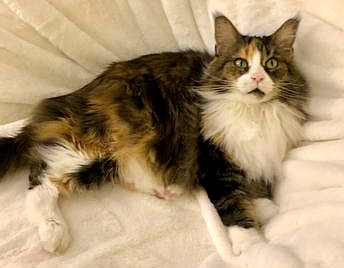 Pretty Patsy
Pretty PatsyI have dealt with matted fur in two ways. If I have another person to help, it's faster and safer to shave a mat right off.
One person can firmly and reassuringly hold the cat while the other shaves the mat.
The second way is to cut it off. It takes longer, but once you get a little experience it's not hard.
I would take a hold of my Maine Coon's fur at the base of the mat and get a good look, and snip it off a little bit at a time.
There are special safety scissors made for this. If you don't have safety scissors or are nervous, it can help to place a fine toothed comb like a flea comb or other stainless steel comb against the skin and cut between that and the mat.
Also, there is a tool called a mat splitter on the market now. When we had our Coonies I hadn't heard of mat splitters yet.
I now have one for my dog, and he doesn't like it! It's necessary to hold the skin because it does get pulled. But with that said, it does work.
Using a mat splitter will probably go best with a laid back cat who doesn't seem to have sensitive skin and enjoys grooming and brushing time.
Excessive grooming and licking: Sometimes cats will exhibit this behavior, for a variety of reasons. On this Question and Answer page, the community discusses these situations.
"Does a Maine Coon need regular baths?"
Not particularly! But they may need to be bathed a bit more than short-haired cats. It's a lot of fur for a cat to self-groom.
With all that extra fur comes the possibility that they get into something.
It's a good idea to have them accustomed to the bath so that when it happens that they need one, it's not a big traumatic procedure (hopefully).
Reasons a Maine Coon might need a bath include getting fleas, having a problem with diarrhea or poo caught in their britches, or due to health problems or aging being unable to groom themselves and needing help to get clean.
Sometimes cats just get messy. My Coonie kittens' first baths occurred when they each, in successive order, hopped into the toilet!
One was being bathed when the next one hopped in. We had no trouble all remembering to close the lid after that event!
Bathing is a part of Maine Coon grooming, so having a gentle pet shampoo on hand is a good idea.
Human shampoos are all right too, as long as they are gentle, don't include conditioner, and are not heavily perfumed.
Maine Coon Cat Grooming and Claw Care:
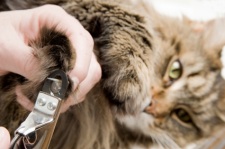 Nail Clipping Time
Nail Clipping TimeSome pet owners are not comfortable with their cat's sharp claws.
Maine Coons are very docile and won't scratch anyone. They benefit from a good cat scratcher or scratching post.
There are health benefits for a cat to be able to stretch and scratch naturally.
For cat owner's who feel like their situation calls for tending to the claws, it's quick and painless to clip them with guillotine style nail clippers.
Another option is a product called Soft Paws, for covering a cat's nails in a rubber encasement. We tried them. They were a bit of a process, but they worked!
Cat Oral Health Care:
Oral hygiene is one of the last thing on the list for many people. But it's an important part of Maine Coon cat grooming!
We have a separate page on cat oral health care for more. Brushing your Maine Coon's teeth may not sound like fun, but it's important.
Lip & Chin Care: Feline Acne
Keep Those Chins Clean! Did you know cats can get acne, just like us?
It's true - One area that often gets overlooked is right under your cat's nose - literally. The lip and chin area can be prone to dirt buildup, irritation, and even feline acne.
It’s not uncommon, and it can happen to cats of any age or breed, though it's more frequent in cats with oily skin or long fur.

Feline acne often appears as small black specks or crusty spots around the chin and lip area.
You might even mistake it for dirt at first. Regularly inspecting and cleaning your cat's chin can help prevent this.
To do this, simply use a warm, damp cloth to gently wipe the area, especially if you notice any buildup.
For persistent feline acne, you might need to consult your vet, who can recommend pet-safe wipes or medicated treatments. But often, a little routine care is all it takes to keep this under control.
Tip: One key culprit behind feline acne is bacteria from plastic food and water bowls.
Try switching to stainless steel or ceramic dishes, which are easier to clean and less likely to harbor bacteria.
Make sure to wash their bowls regularly to prevent any lingering dirt or oil from irritating their skin.
If your kitty has a lush mane, give the area around the chin a quick comb-through to make sure no food or debris gets trapped there.
Regular cleaning is especially important if your cat has a habit of rubbing their face after meals.
Checking your cat's chin and lip area might seem like a small thing, but it can make a big difference in keeping them clean and comfortable. Plus, most cats love the extra attention!
"Do I need to go to a professional groomer?"
 Maine Coon Cat Grooming - Macy Gray is well-groomed
Maine Coon Cat Grooming - Macy Gray is well-groomedMost of us will never need to visit a professional to take care of our Maine Coon Cat grooming needs.
Sometimes it's really necessary, like in the case of a newly rescued cat who is very matted.
And sometimes a cat is so uncooperative that it's the only way to safely get him cleaned up without being scratched or bitten.
But for your average Maine Coon, bear in mind that it's not like taking our canine friends to the groomers.
Dogs are happy to go places, meet new people, and generally understand what's going on.
A cat will be held down by strangers, have something covering his eyes, likely have his claws covered, and there will be frightening sounds and sensations. Some even need to be sedated.
Except in the case of cats with very extraverted and dog-like personalities, grooming time should hopefully be accomplished at home.
Grooming is something that all pet parents have to do at some point, and Maine Coon grooming is no exception! But it's really not all that much work.
Hopefully the grooming regimen for your best friend turns out to be a fun and bonding experience.
Recent Articles
-
Will a Maine Coon Protect Its Owner From Danger or an Intruder?
Apr 09, 25 10:41 PM
Plenty of people are curious: Will a Maine Coon protect its owner if something happens? Let’s talk about what this means, and what kind of protector a Coonie is. -
9 Types of Maine Coon Cats and How to Tell Them Apart
Apr 09, 25 03:58 PM
When people say "types of Maine Coon cats," they're usually talking about color. But as Coonie lovers know, there’s a lot more to it than that! From wild-looking European lines to polydactyl paws and… -
10 Questions to Ask a Breeder Before You Commit
Apr 08, 25 03:51 PM
Here are some important conversation starters and questions to ask a breeder that can help you feel confident about where your future furbaby is coming from. This is a big decision - whether you're le…
